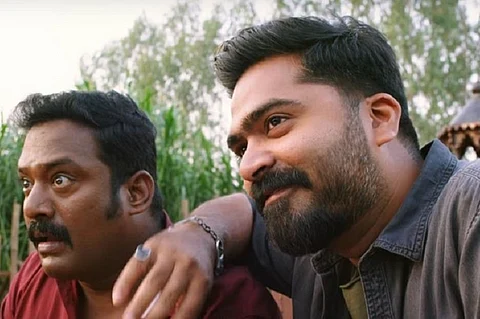

How do you cast stellar actors like Ramya Krishnan, Prabhu, Nasser and Suman, and still manage to barely make an average film? Director Sundar C has the perfect formula for that - use an age-old script of family dispute and then drag in an over-the-top Silambarasan to play, well, himself.
To be fair to the director, the film is a faithful remake of the 2013 Pawan Kalyan-starrer Attarintiki Daredi. But while the power star's screen presence and the film's comedy sequences appealed to the Telugu audience, the Tamil remake only manages to engage the viewer in parts.
Simbu plays the role of Aditya, a multi-millionaire businessman from Spain who doubles as a hitman for his wheelchair-bound grandfather Raghunandhan (Nasser). The family has 'lakhs of crores', is involved in finding a cure for cancer, lives in a palatial residence and has multiple butlers surrounding them to tend to their every need. But Raghunandhan remains unhappy like a 'poor man' (the hero's words, not mine). This is because he drove away his daughter Nandhini (Ramya Krishnan) from the house, for marrying a lowly lawyer Prakash (Prabhu) who studied on a scholarship offered by her own family.
The rest of the film showcases how Aditya comes to Chennai as 'Raja' and tries to take his aunt back to Spain to see the ailing Raghunandhan. Simbu has great comic timing, and this time, the butt of most of his jokes is himself. This makes the process even more enjoyable. For example, as he is watching a montage of film scenes on TV, he asks his assistant VTV Ganesh, "Nambalum nadicha enna?" (Why can't I also act?). To this, Ganesh immediately replies, "Adhuku modhala shooting ku time ku varanum" (For that, you need to come on time for shooting). These directs references to Simbu's recent telling off by the Producer's Council stretch to include the 'red card'. It's almost as if the actor is admitting to all his off screen irresponsible behaviour on screen.
While the first half of the film manages to keep you mildly engaged and entertained with wild displays of wealth and strength by Simbu, the second half's screenplay pushes the entire movie downhill. A random detour from Chennai to Madurai to display long action sequences and cringe-worthy love scenes proves to be costly for the screenplay. However, the audience's hope is rekindled when Yogi Babu appears on screen following the interval. So, imagine the disappointment when his 10 minute comedy sequence (and the comedian) falls flat on its face. The film is more satisfied with Yogi being beaten up than allowing him to display his comic timing through dialogues.
Throughout the film, you get the distinct feeling that Nandhini and Prakash are living in a different dimension compared to Simbu and the rest of the cast. While real-life problems plague this pair (like debt and health issues), the rest of the family, which includes their two daughters played by Megha Akash and Caterine Tresa, live in a strange bubble, and constantly break into song and dance. It's almost like the director knew that the audience can't handle some of the industry's best actors being pushed into surreal sequences (but went ahead and did it anyway).
The two factors that further make certain portions of the film hard to digest are the classism and sexism on display. The classism that prevails through the film, while aimed at being comical is, in fact, troubling. In Simbu's opening song, he can be seen making his assistant VTV Ganesh carry his shoes as he walks ahead with 'gethu'. In other scenes, he is seen constantly abusing the men who surround him, despite claiming that the divide based on class is problematic as the film progresses.
Megha and Catherine, too, are exposed to the male gaze constantly. In Megha's introduction scene, she is shown struggling with the zipper on the back of her dress and Aditya (Simbu), who has just come into the house, enters her room and pulls it up without permission. In another encounter, he enters her bathroom when she is in just a towel and brushes off her protests. At a time when the media is struggling to emphasise the importance of consent, to make a hero harass the heroine and pass it off as swag is unacceptable.
The music by Hiphop Tamizha is catchy; Simbu is clearly not at the peak of his dancing form but he still manages to entertain. The stunt sequences are visually appealing, especially the one in Madurai that happens bang in the middle of a temple festival.
Vantha Rajavatha Varuven was marketed as a 'commercial film' and to expect logic is impractical. But the movie is, at its best, average and at its worst unbearable as it progresses. It simply does not have the "mass" appeal, despite how desperately it tries.
Disclaimer: This review was not paid for or commissioned by anyone associated with the film. Neither TNM nor any of its reviewers have any sort of business relationship with the film's producers or any other members of its cast and crew.